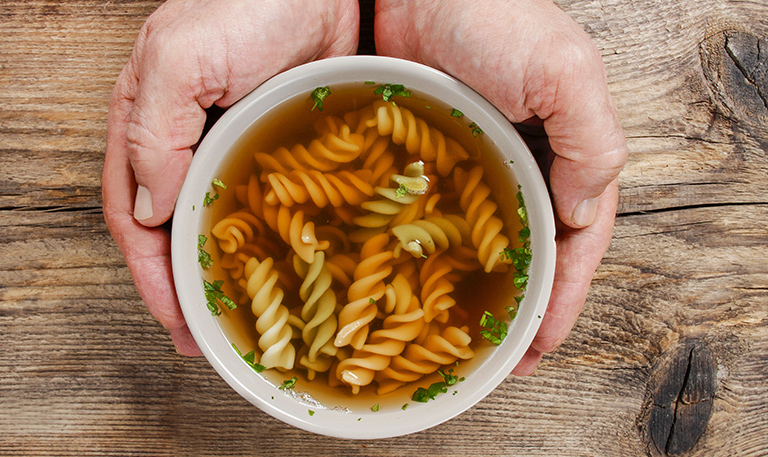Food makes memories. How about that homemade meal of braised pork chops with brandy glaze, homemade applesauce with cloves and ginger, and double whipped mashed potatoes with garlic and chives, all to help you celebrate your return from that big trip. Or a trip to your favorite restaurant to commemorate the first work promotion. Homemade snickerdoodles for the road when you go back to college after the long weekend. And pot roast when the winter blues gets you by the nose.
Food for comfort. Food for the belly, the nose, the taste buds, and the heart.
For so many, food is the major way we show our love, our support, and gratitude: the thank you loaf of banana bread, the chicken soup from scratch when someone is sick. All these recipes show how much we care. We use food as medicine for the heart, mind and soul.
So it only makes sense that when we’re supporting a family member or friend who is in their dying process, food can be a huge issue for everyone. Here are some ideas to help you make food a key ingredient in these passages:
- Use the scent of foods to nurture people rather than just feed them. The Hospice House here in Bellingham is perpetually baking cookies and has two pots of soup going all the time. The nurturing, calming effect of the smell of fresh-baked cookies and of soup helps folks feel more relaxed and at home. At a time when emotions can be high, this is a welcome feeling. We hear that “the way to a man’s heart is through the stomach,” but maybe it’s through the nose.
- As the need and the want of food decreases naturally toward the end of life’s journey, try other ways of offering nurturing care and support. Since your loved one may not want food, try reading a poem, brushing her hair, giving him a foot massage, singing a song, reading a story, or telling stories about their lives and accomplishments. You may find that just sitting in silence with them is healing. Feed them with love, instead of spaghetti.
- Eating root vegetables can offer energetic and spiritual medicine to keep people grounded, calm, balanced, and resourced. Make sure to get enough protein and energy-boosting carbs, like whole grains and meats. Too much sugar and alcohol can create blood sugar peaks and lows that can compound the effects of stress and grief.
- Set up a meal train for the caregivers. Tending to the helpers and the family is a very needed thing and often overlooked. As people pour out their energy to care for the sick and dying, don’t forget to feed them.
These ideas are all good food for thought-fulness.
Ashley T Benem is the founder of the non-profit A Sacred Passing: Death Midwifery Service and the creator of The Art of Death Conference. She is an advocate for palliative and end-of-life care issues, empowering and supporting families to reclaim their right to die in congruence with their lives. Contact Ashley at asacredpassing@gmail.com.


